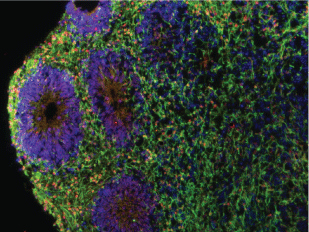
Close up of iPSCs – Image by: Erika Pedrosa, M.S.
Human embryonic stem cells (hESCs) have long held great promise in medical research because they are pluripotent—able to differentiate into any of the more than 100 types of tissue in the body.
In 2001, ethical concerns over obtaining these cells from human embryos led the U.S. government to limit the use of hESCs. The discovery of induced pluripotent stem cells (iPSCs) by Shinya Yamanaka, M.D.—a Japanese researcher who won the Nobel Prize and spoke at Einstein about his work—greatly boosted the field of stem cell research. iPSCs are grown from adult human skin cells, so their use doesn’t raise ethical concerns.
Einstein scientists are using iPSCs to advance knowledge of conditions including autism, Parkinson’s and schizophrenia at our Gottesman Institute for Stem Cell and Regenerative Medicine Research. The institute has a Pluripotent Stem Cell Unit, which creates iPSCs for the Einstein research community and trains people to work with these stem cells.
We recently explored iPSCs in a cover story in Einstein magazine that looked at some of the ways Einstein researchers are using them:
- seeking a method to produce red blood cells on a large scale to help meet the demand for blood;
- comparing the neurons of people with and without schizophrenia and coaxing iPSCs to form structures found in the developing forebrain to come up with new drugs for treating schizophrenia; and
- investigating a portion of a chromosome whose deletion or duplication increases the risk for autism.
Learn more about iPSCs at https://magazine.einstein.yu.edu/winterspring-2014/ips-cell-technology/.

